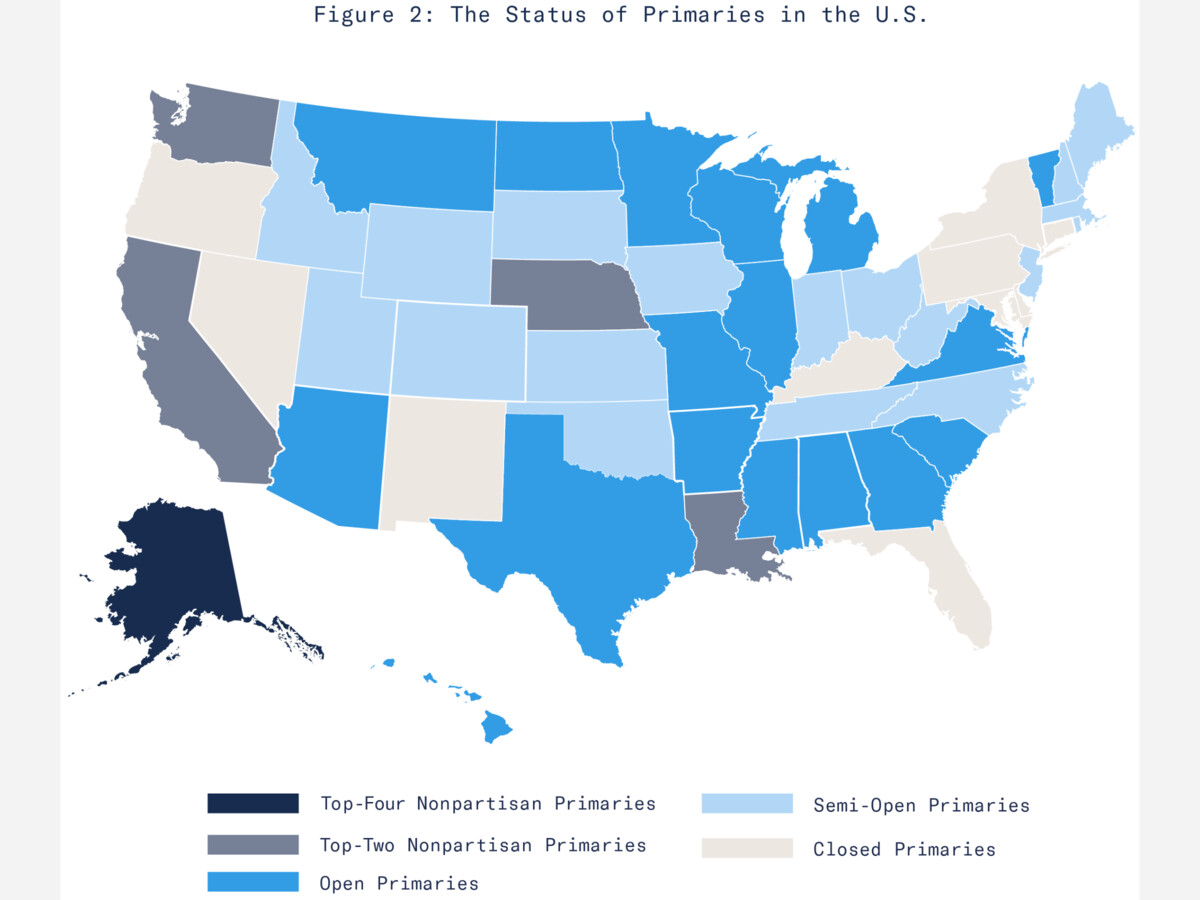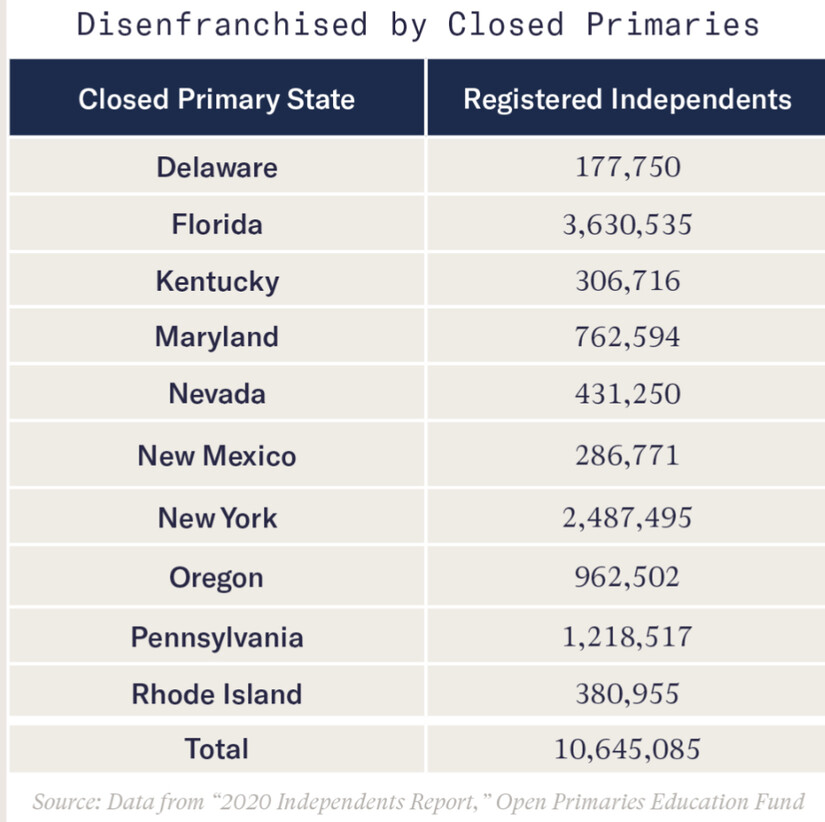Image


New Mexico House Bill 54 proposes Open Primaries which would bring Independents and Decline to States into the primary fold.
New Mexico house bill 54 of the 2023 legislative session proposes changes to state primary elections. If House Bill 54 passes, voters would no longer need to declare a party registration to participate in a primary. Currently, voters registered as Democrat or Republican can vote with their party in primary elections. New Mexico has about 300,000 Independent voters and the number appears to be growing nationwide as voters become disenchanted with the 2 party system.

An open primary is a primary election that does not require voters to be affiliated with a political party in order to vote for partisan candidates. In a traditional open primary, voters may select one party's ballot and vote for that party's nomination. As in a closed primary (such that only those affiliated with a political party may vote), the highest voted candidate in each party then proceeds to the general election. In a nonpartisan blanket primary, all candidates appear on the same ballot and the two highest voted candidates proceed to the runoff election, regardless of party affiliation.
The constitutionality of this system was affirmed by the Supreme Court of the United States in Washington State Grange v. Washington State Republican Party in 2008, whereas a partisan blanket primary was previously ruled to be unconstitutional in 2000. The arguments for open primaries are that voters can make independent choices, building consensus that the electoral process is not splintered or undermined by the presence of multiple political parties.
An argument to consider. The two major parties are typically against an open primary system as those at the top quietly argue it weakens their strength and control.
Rules for how the two major parties—Democratic and Republican—control the participation and administration of our country’s elections are ingrained in thr state’s electoral code. Secretaries of State are as likely to be leaders in partisan movements as they are independent election watchdogs. Most states require election workers to be members of one of the two major parties and outsource their selection to party leaders. If you are not a registered Republican or Democrat, you can’t serve on many state or local boards of elections nor serve as an election judge
The primary election system is a particularly egregious example of the consequences of allowing private organizations to control the electoral machinery. Primary elections are publicly funded and every state spends tens of millions of taxpayer dollars to run them every election year. They are held in public locations, staffed by public-paid workers, run on public-owned machines, and administered by publicly elected officials. And yet, by law, these private entities write the rules that determine who can and cannot participate.
Arizona allows independent voters to vote in legislative primaries but not presidential primaries. Oklahoma and South Dakota allow independents to vote in Democratic primaries but not Republican primaries. The rules are written to privilege the parties at the expense of the voters.
In addition to the fact that too few voters have a voice in primary elections, winners often emerge with less than majority support from the few who do show up. In 2020, of the 161 partisan primaries in safe districts with at least two candidates, a quarter (26%), were won by a candidate who did not receive majority support. This happens when votes are split among candidates, making the actual number of votes needed to win in some districts an extremely low plurality.
This has always been an injustice and a stain on democratic rule. Every voter should have equal access to every publicly funded election. It’s also increasingly becoming a key driver of political polarization and government dysfunction as well.
How did this happen? Primary elections were a key reform of the Progressive era of the early twentieth century. They represented a significant advancement: the invitation of the voters into the smoke-filled rooms where party nominations had previously been decided. This worked for decades because almost every registered voter in the U.S. was a Republican or Democrat. In 1961, over 80% of Americans were members of either the Democratic or Republican parties. That is nowhere near the case, today.
We are now in the middle of a political realignment with very dramatic consequences for how our democracy works. One or both major parties are contracting in almost every state. The largest and fastest growing group of voters are now registered, independent voters. They are already the largest or second largest group of voters in half the states in the country. Within a few years, they will dominate every state. 50% of millennials and Gen-Z voters, the largest block of voters in the country by age, are registering as independents. That’s having a profound effect on a political system that wasn’t designed for them.
This sea change in how voters are affiliating politically is interacting with another major historical trend: the decades-long drop in general election competition. Competition for Congressional seats is at the lowest level in several decades. Out of 435 seats in the House of Representatives, only 40 are considered competitive. It’s even worse in state legislatures. In 2020, 35% of general election races saw candidates running unopposed. Unopposed! It’s no wonder the U.S. has such low voter participation; our elections are becoming less and less meaningful.
This means that primary elections are increasingly the elections that matter. And with large segments of the electorate shut out in closed partisan primaries, smaller and smaller groups of increasingly partisan voters are calling all the shots. People running for office must swear allegiance to the most partisan principles of their party, as a result. That’s not only producing more polarizing candidates but also limiting the pool of voters these candidates are accountable to in order to get elected and stay in office.
What’s the solution? It begins with letting every voter vote. Public elections that shut out tens of millions of voters are, on their face, an affront to democracy and a self-evident recipe for dysfunctional government.
Four states — California, Washington, Nebraska (for state legislative race), and Alaska (starting this year) — now conduct nonpartisan public primaries. It is not a new concept; 85% of cities in the United States, including 23 of the 30 largest cities, use nonpartisan elections to elect municipal officers.
Should New Mexico House Bill 54 pass? It has failed before due to pressure and influence of the two major parties. Power does not like to share power. Contact your state representatives and state senators and let them know how you feel about open primaries.
To see what the New Mexico legislature is up to visit https://www.nmlegis.gov/
Article Sources: New Mexico Legislative Agenda 2023, 2020 Independents Report, Unite America, Ballotopia, National Leadership Conference, Pew Research